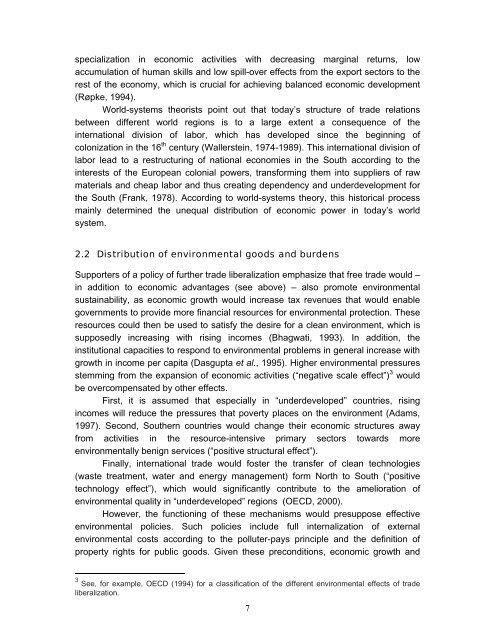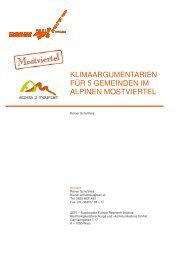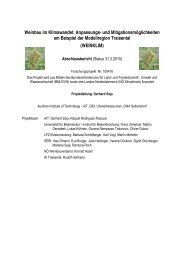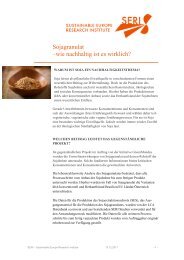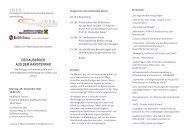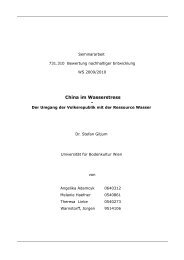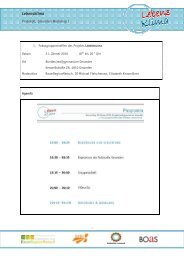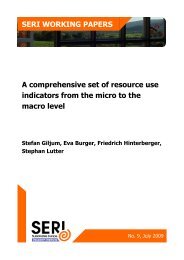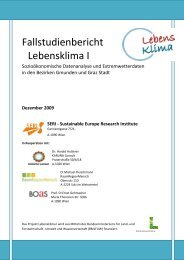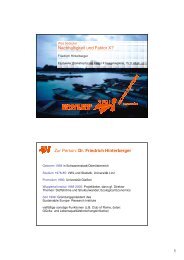Download PDF - Sustainable Europe Research Institute
Download PDF - Sustainable Europe Research Institute
Download PDF - Sustainable Europe Research Institute
You also want an ePaper? Increase the reach of your titles
YUMPU automatically turns print PDFs into web optimized ePapers that Google loves.
specialization in economic activities with decreasing marginal returns, low<br />
accumulation of human skills and low spill-over effects from the export sectors to the<br />
rest of the economy, which is crucial for achieving balanced economic development<br />
(Røpke, 1994).<br />
World-systems theorists point out that today’s structure of trade relations<br />
between different world regions is to a large extent a consequence of the<br />
international division of labor, which has developed since the beginning of<br />
colonization in the 16 th century (Wallerstein, 1974-1989). This international division of<br />
labor lead to a restructuring of national economies in the South according to the<br />
interests of the <strong>Europe</strong>an colonial powers, transforming them into suppliers of raw<br />
materials and cheap labor and thus creating dependency and underdevelopment for<br />
the South (Frank, 1978). According to world-systems theory, this historical process<br />
mainly determined the unequal distribution of economic power in today’s world<br />
system.<br />
2.2 Distribution of environmental goods and burdens<br />
Supporters of a policy of further trade liberalization emphasize that free trade would –<br />
in addition to economic advantages (see above) – also promote environmental<br />
sustainability, as economic growth would increase tax revenues that would enable<br />
governments to provide more financial resources for environmental protection. These<br />
resources could then be used to satisfy the desire for a clean environment, which is<br />
supposedly increasing with rising incomes (Bhagwati, 1993). In addition, the<br />
institutional capacities to respond to environmental problems in general increase with<br />
growth in income per capita (Dasgupta et al., 1995). Higher environmental pressures<br />
stemming from the expansion of economic activities (“negative scale effect”) 3 would<br />
be overcompensated by other effects.<br />
First, it is assumed that especially in “underdeveloped” countries, rising<br />
incomes will reduce the pressures that poverty places on the environment (Adams,<br />
1997). Second, Southern countries would change their economic structures away<br />
from activities in the resource-intensive primary sectors towards more<br />
environmentally benign services (“positive structural effect”).<br />
Finally, international trade would foster the transfer of clean technologies<br />
(waste treatment, water and energy management) form North to South (“positive<br />
technology effect”), which would significantly contribute to the amelioration of<br />
environmental quality in “underdeveloped” regions (OECD, 2000).<br />
However, the functioning of these mechanisms would presuppose effective<br />
environmental policies. Such policies include full internalization of external<br />
environmental costs according to the polluter-pays principle and the definition of<br />
property rights for public goods. Given these preconditions, economic growth and<br />
3<br />
See, for example, OECD (1994) for a classification of the different environmental effects of trade<br />
liberalization.<br />
7


